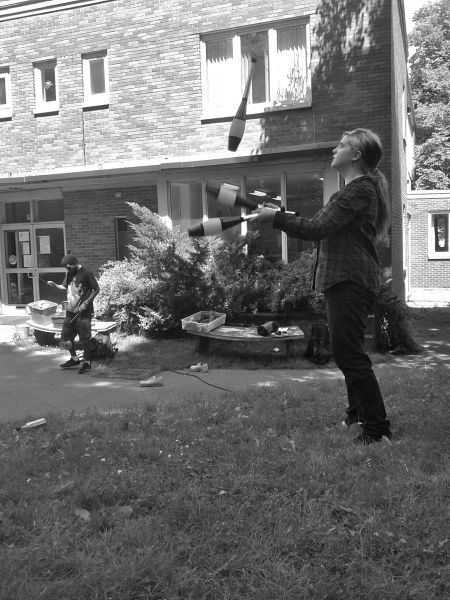When thinking about social programs for youth in trouble, one might imagine therapy sessions.
But one alternative program, Circus Circle, offers a unique, artistic way to engage with the body and mind, and a very different form of healing through creativity.
Circus Circle is one of many Social Circus programs worldwide geared towards street and marginalized youth that teaches life skills through circus arts.
Mike Hirschbach, Director of Circus Circle, has been teaching with Social Circus since 2001.
“This is not about turning people into performers,” explains Hirschbach, “it takes dedication, self-discipline, communication, and trust. The kids who come here learn how to be trustworthy and they learn how to trust others.”
When kids are given a positive and creative way to draw attention to them they will do that, but if not they will find negative ways to get attention, says Hirschbach.
For kids having serious difficulties in their lives, self-respect and drive can decrease. By having a creative and safe space where they can be as free as they want and feel accepted and respected, the possibility of learning trust unfolds as well.
“It is a community that nobody judges you. People are here to help and see you succeed. After a while it becomes your home, and the people here become your family“ says Chantel Arbuckle, a 17-year-old who has been attending Circus Circle for over a year, learning to master the Diabolo and juggle.
The goal of Social Circus, according to its website, “is not to learn the circus arts, but rather to assist with participants’ personal and social development by nurturing their self-esteem and trust in others, as well as by helping them to acquire social skills, express their creativity, and become active citizens.”
Social circus not only builds self-esteem and trust: it creates the realization that these youth are capable of learning, an ability of which many easily lose sight..
By being encouraged to learn circus arts, youth realize that they also are able to become teachers and mentors to their peers. This helps them to realize they are capable teachers as well as students, a whole new role that they may have never experienced, Hirschbach says.
At Circus Circle I watched a 12-year-old showing and helping a 23-year-old how to do a trick with the Diabolo, and youth showed me how to do partner juggling and Diablo tricks.
“For many of these kids, they are having a positive experience with adults, in some cases it is the first time in years” says Hirschbach.
John Pearson, a twelve-year-old who has been participating in Circus Circle for almost a year, says that he likes the program because “It is a nice place and there are nice people,” but the best thing he has gained is his “friendship with Mike [Hirschbach].”
“When kids come, we don’t ask questions about why they are here, their background, or history, we give them the chance to redefine themselves,” explains Hirschbach. Many kids who come are known for their misbehavior outside of Circus Circle, but at this group they are given the opportunity to explore and create a new identity, and they often do.
“They become the ‘kid who is really good on the unicycle’, ‘the one who always helps set up and clean up the equipment’, ‘the one who is great at acrobatics,’” Hirschbach says.
What is important is bringing people together in unexpected ways and creating alliances, explains Hirschbach: gender, sexual orientation, economic background, and race are unimportant. “They just don’t matter because everyone is here to get better at something.”
At the end of each session, everyone takes a turn showing the group what they have been working on. “You don’t have to be perfect, no one is. We can help one another find the best way to do it” Hirschbach told the group.
Social Circus uses marginality as a strength, rather then trying to take that away from those whose lives are perhaps ‘off the beaten path.’
Iif after a year of coming to Circus Circle the youth have strong circus skills but their life circumstances have not changed, then the program has failed, Hirschbach says. But if after a year they gain moderate circus skills and their life circumstances have changed in a positive way, then the program has been successful.
Circus Circle began in Halifax in 2009 and in its first year had over 600 youth participants. There are now four programs a week in three different locations: Halifax, Dartmouth, and Preston.



